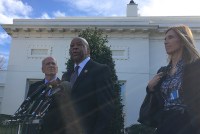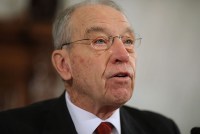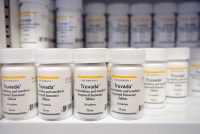Latest KFF Health News Stories
To Save On Drug Costs, Insurer Wants To Steer You To ‘Preferred’ Pharmacies
Blue Shield of California is hoping to steer consumers to “preferred” pharmacies where drugs are cheaper and copays lower.
Trump, Dems Look For Common Ground On Drug Prices
Two Democratic congressmen met with President Trump to seek his support for a bill to expand the government’s ability to negotiate drug prices, but it’s not clear it would have much impact or will gain support.
Making Multiple Drugs In One Factory Risks Scary Side Effect Of Shortages
Hundreds of drug brands are being made in giant contract facilities. When a plant shuts down, a widespread drain on supply can result.
President Trump And I Take The Same Drugs — Except One
An aging writer discovers there are worse things than going bald after examining the side effects of a popular hair loss drug purportedly used by President Donald Trump.
Los geriatras pueden ayudar a los pacientes a superar enfermedades múltiples
Nadie entiende mejor que estos especialistas en envejecimiento cómo múltiples problemas médicos interactúan en las personas mayores, y cómo pueden afectar su calidad de vida. Sin embargo, su papel en el sistema de atención de salud sigue siendo poco comprendido y sus conocimientos, subutilizados.
Geriatricians Can Help Aging Patients Navigate Multiple Ailments
Aging adults with complex needs can get special assistance from doctors trained as geriatricians.
Docs In Northwest Tweak Aid-In-Dying Drugs To Prevent Prolonged Deaths
Some terminal patients, typically high-dose opioid users, who choose to end their lives have taken many hours, even days, to die.
Health Law’s 10 Essential Benefits: A Look At What’s At Risk In GOP Overhaul
The woman set to run the federal Centers for Medicare & Medicaid Services told senators last week that maternity coverage should be optional in individual and small group plans. But other services could also be left on the cutting room floor.
Former FDA Chief Cites 5 Things To Watch On Drug Approvals And Keeping Drugs Safe
Former FDA Commissioner Dr. Robert Califf shares his views about drug approvals, regulations and safety concerns after stepping down from the giant agency.
Drugmaker Marathon ‘Pausing’ Delivery Of $89,000-A-Year Muscular Dystrophy Drug
After hearing complaints about its high price, Marathon Pharmaceuticals is pausing the launch of an $89,000 drug for a rare disease.
Grassley Launches Inquiry Into Orphan Drugs After KHN Investigation
Citing a Kaiser Health News investigation, Senate Judiciary Committee Chairman Chuck Grassley vows to examine the orphan drug program and possible fixes.
Pharmacies Thrive Selling Opioids For Depressed Small Town Pain
Prescription pain pills are strong sellers in this southeastern Kentucky region that’s long struggled with high rates of joblessness and poor health.
Luke Whitbeck’s life was saved by a rare disease drug, but it costs $300,000 a year.
Women Fear Drug They Used To Halt Puberty Led To Health Problems
Despite questions about Lupron’s lasting side effects and minimal study into its safety, the FDA sped approval of the drug to market. Years later, some young women are still living with the consequences.
Prescribing Opioids To Seniors: It’s A Balancing Act
An expert geriatrician says the benefits for the patient, such as alleviating pain and maintaining independence, must be weighed against the possible risks. Her motto: ‘start low and go slow.’
Drug Prices, Opioids, And Obamacare: A Conversation With Assemblyman Jim Wood
Wood, who chairs the Assembly Health Committee, lays out his priorities for 2017.
Spreading The Word About HIV Prevention For African-American Women
African-American women are more likely to be infected with HIV than other women. So the District of Columbia is launching an effort to inform them about PrEP, medication that can reduce their risk.
KHN Video: Orphan Drugs Creating Gold Rush For Pharmaceutical Firms
The designation, which is made by the Food and Drug Administration, allows drugmakers to claim seven years of market exclusivity.
Sky-High Prices For Orphan Drugs Slam American Families And Insurers
Orphan drugs for rare diseases have helped or saved hundreds of thousands of patients like 2-year-old Luke Whitbeck, but families and insurers are picking up the astronomical cost.
Una investigación de Kaiser Health News analiza las acciones de compañias farmacéuticas para manipular los precios de medicamentos huérfanos, utilizados para tratar enfermedades raras.


























